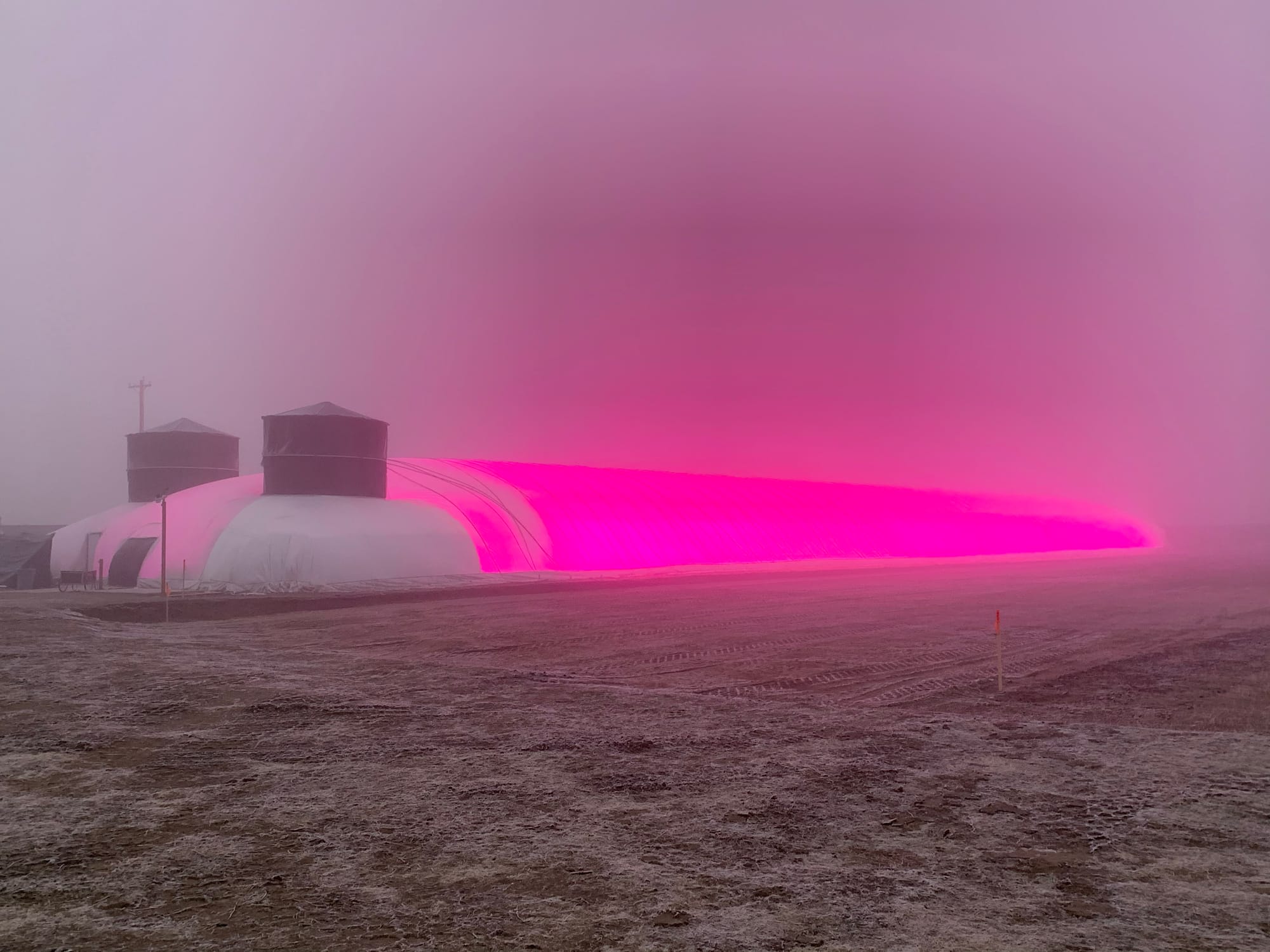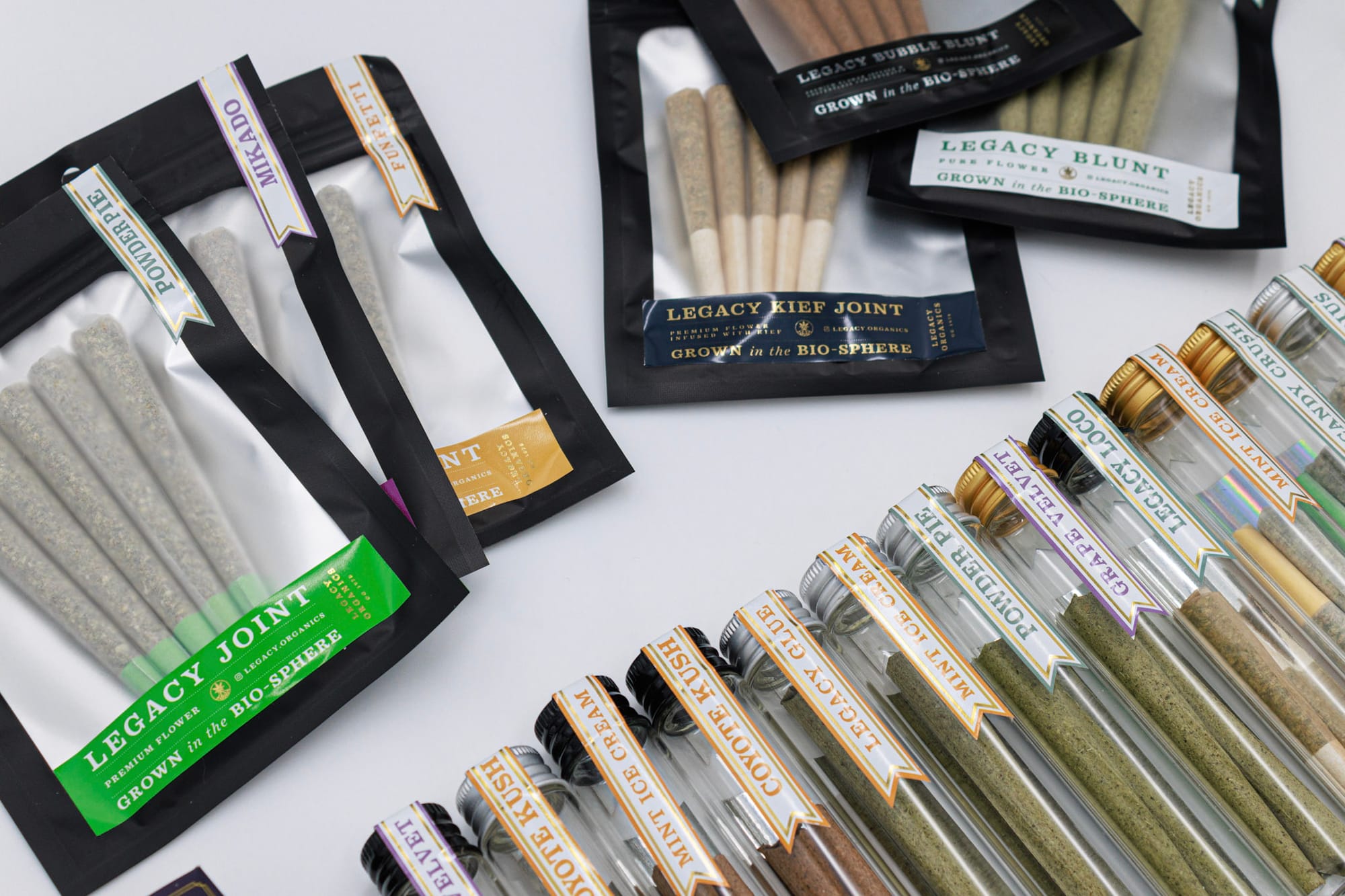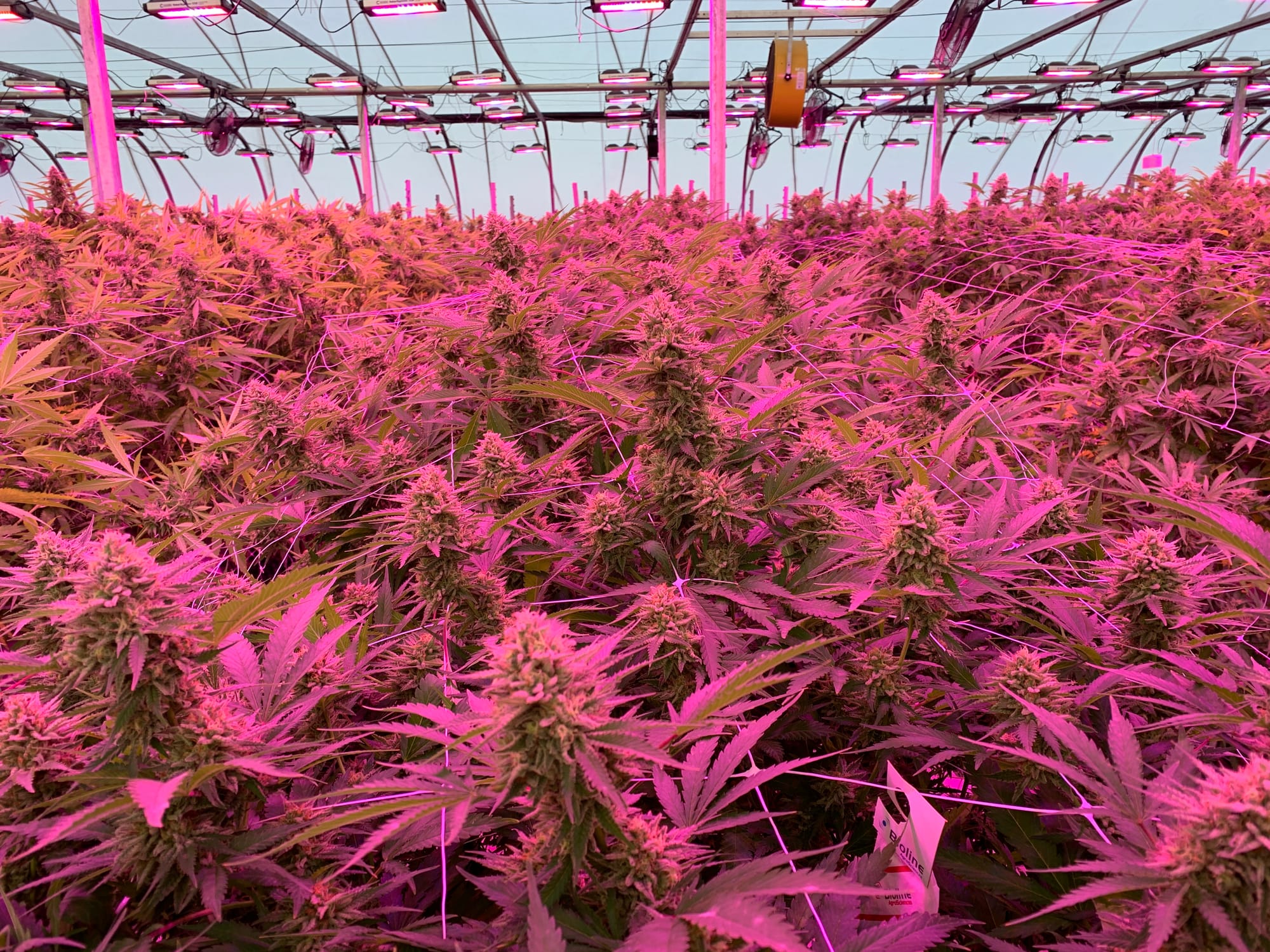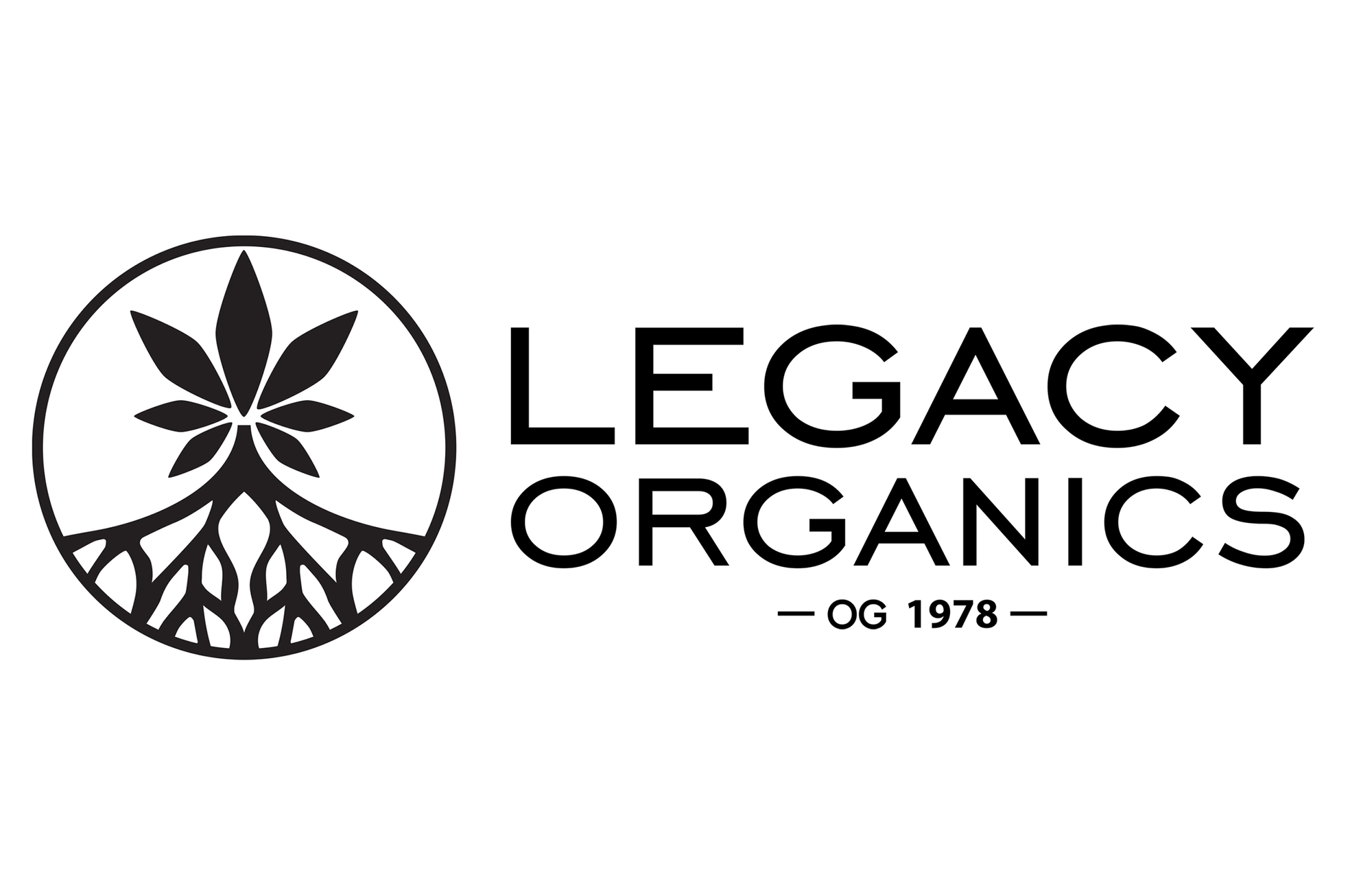This local cannabis powerhouse puts care into every aspect of their business, from their environmental impact to the quality of their smoke.

If you’re not already familiar with Legacy Organics, you might have heard about the ‘UFO’ sightings out at their farm in Kennewick. The glowing, pink LEDs at their grow site can be seen as far away as Burbank.
But while Legacy Organics isn’t admitting to harboring aliens, they do have some very unique ways of doing things.
“It's not like most marijuana operations,” says Legacy Organics Director of Operations Josiah Glesener. “It's a positive air-pressured structure made from material that’s able to collect and utilize the UV rays from the sun itself, along with energy-efficient lighting.” They have the only positive air-pressure grow in Washington state.
The idea for their unique biosphere growing method came from Legacy Organics founder and owner, Steve Berman. An architect by trade, he came up with the idea of the biosphere after seeing a pop-up soccer arena match in Europe. Having been a collector of genetics since 1978, Berman saw the potential for a similar pop-up to be used in growing cannabis. Head Grower Jay Kennedy, who has over 20 years in the field, says that the growing conditions of the biosphere are perfect for the Pacific Northwest.
Legacy Organics is one of a very few local farms that supply marijuana dispensaries like Green2Go. Steve Lee, owner of Green2Go, also loves working with other local businesses. “As we are a truly local mom-and-pop shop, we put supporting local mom-and-pop farms at the top of our priority list,” Lee says. “Nothing brings us more joy than being the place where our local teams of producers and processors can see their own products on the shelf.”
And the folks at Legacy Organics are grateful for Green2Go’s commitment to local business, too. “Green2Go has just been one of the most important relationships that we've had to help put us on an upward trajectory,” says Glesener. “They are one of the biggest and fastest moving [cannabis] companies in the entire state.”

Even though Legacy Organics has been around for a little over six years, during that time, they have largely been working with other brands, supplying them with cannabis. Just recently, they have begun to create their own consumer products. “It is a bit of a struggle to create some brand awareness this late in the game, now that we have our own products out in the market,” Glesener says. “You have a lot of these bigger fish out there that have had footholds for so long. What makes us special is that we are such a local farm, and a craft brand; and honestly, we have the only grow like it in the entirety of the state.”
What makes Legacy Organics’ grow operation so unique is that they utilize the biosphere and their positive air-pressured structure instead of relying on any harsh chemicals, pesticides, or insecticides. With positive air pressure acting like a vacuum, unwanted pests are blown away before they even get the chance to enter the facility. “It’ll blow your hat off just trying to walk in through the door,” says Glesener.
The grow operation is more than just the positive air pressure system, though. The biosphere is made of material that is able to harness the natural UV rays from the sun, and the farm pairs that with energy-efficient supplemental lighting. In addition to lighting techniques, Legacy Organics also uses heated flowerbeds, above ground aerated pots, and air intake fans mimicking natural airflow — all working in conjunction to create environmentally sustainable factors throughout the entire facility.
“All of those things work together, but none is as important as the cherry on top — having the all-natural living soil,” Glesener says. “We constantly monitor it, and do weekly soil tissue SAP analyses, looking for any deficiencies that we can address.” Legacy Organics farmers also introduce beneficial living organisms into the soil, a practice of many (if not most) organic farms. Not only is this practice beneficial to the soil, but Glesener says it also has other effects on cannabis: “We do what we can to trigger the plant’s natural defense mechanism in a positive manner — not to where we're not harming the plant or stressing it out to too far, but to the point of triggering the secretion of increased terpenes, and increasing the THC contents of the product itself, making a more visually aesthetic and just more potent product.”
Glesener and Kennedy describe Legacy Organics as “a self-contained living ecosystem, using nature with science.”


Though Legacy Organics has a sophisticated, environmentally-friendly grow operation, they are still struggling to get recognition in the commercial realm.
“The problem right now is that a lot of the state doesn't know who we are,”says Glesener. “I’m working to spread the word about why we're unique, and what makes us different. I know a lot of people around here want to support local cannabis, and support local jobs, and support the local economy.”
Like in many industries, a few national or multinational companies control a large percentage of the market, which makes it difficult for small, local businesses to thrive. “When cannabis shops get 50% or more of their product from huge national companies, it pushes a lot of these smaller growers out,” says Kennedy. “That's not supporting the local economy too much.”
Because of the prevalence of laws regarding the production and sale of cannabis products, the market is even more complicated than it is for farmers that grow other kinds of produce. “Right now, it's like extreme capitalism,” Kennedy Says. “Normally in retail, if there's a product like shampoo, or a hairbrush or something, there's only so much competition in that area. There are only so many peanut butters on the shelf, whereas right now, you have 500 cannabis farms, all with independent brands, all fighting for the exact same shelf space. And so it's like this game of winners and losers, margins and efficiency — and so it becomes vitally important how you set yourself apart from everybody else.”

Over the last six years, Legacy Organics has been supplying a lot of big brands in the state. “You have probably seen Legacy Organics on labels from some of the more well-known brands,” says Glesener. “And now that we’ve had those relationships and seen what all these companies have done right and done wrong, we’re better able to form our own product line in-house.”
Legacy Organics has recently begun working from end-to-end on creating products in order to maintain a more critical quality control. “You know, when we first launched, we made the mistake of working with a third party company for packaging, and we were losing that level of quality control,” says Glesener. “Once we were able to see what was going out into the market, we were quickly able to rectify the situation, bringing everything in-house to keep it single source.”
The most important factor for Legacy Organics products, according to Glesener and Kennedy, is quality. On their website, there is a lot of information about the various strains of cannabis they grow and work with. Glesener says that the integrity of each product has a lot to do with keeping them strain-specific. “People know exactly what they're going to get,” he says. “Not only in the flavor, but in the consistency of the high.” They also only use full flower in their pre-rolls. “We don’t use trim, and we sift out all the stems, instead of pulverizing them like many other companies do.”
Now that they are controlling the entire process from start to finish, Legacy Organics is also looking for ways to cut down on their environmental impact in packaging. Whereas most of the pre-rolls on the market are sold in single-use plastic tubes, Legacy Organics has chosen to use food-grade, recyclable glass for their products.
They also participate in the circular economy as much as they’re able, although a lot of the limitations on the cannabis industry can sometimes make that difficult. “We want to work in synchrony with the farms around us, so we can have a symbiotic relationship,” says Glesener. “We can give our old soil, or cuttings that we have, and provide them to an outdoor grow, so that we can build a relationship with them. And they might provide some of their material or frozen store that we can use for concentrates. And we continue building both of our brands.”
Now Legacy Organics handles everything — from the growth of the clone, to the planting, to the harvesting, to the processing, to the packaging, to the sales and distribution. They create a wide range of products: flower lines, pre-rolls, concentrates, infused products, and more. They don’t currently make any products that require chemical extraction (like solvents and tinctures), since that process requires a specialized facility and licensure. “But we're always looking for new opportunities, whether that be something that we're able to achieve on our own, or having a conversation with another reputable person in the industry to see how we could progress together,” says Glesener.
“Legacy Organics works with nature, not against it.” — Jay Kennedy
Learn more about Legacy Organics on their website: legacyorganics.com and follow them on Instagram: instagram.com/legacy.organics
Also, see the Legacy Organics features in Northwest Leaf in 2022 and 2023.
Sara Quinn is the Editor in Chief at Tumbleweird. She lives with her amazing spouse (Brendan), and her doggos (Lila and Jewel). Sara makes art, writes stuff, reads A TON, and plays a lot of video games.


